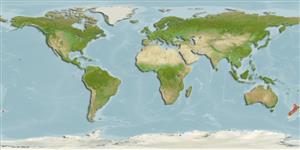Preferred temperature (Ref.
115969): 8.5 - 16.5, mean 12.6 (based on 29 cells).
Phylogenetic diversity index (Ref.
82804): PD
50 = 0.5000 [Uniqueness, from 0.5 = low to 2.0 = high].
Bayesian length-weight: a=0.00851 (0.00685 - 0.01057), b=3.13 (3.07 - 3.19), in cm Total Length, based on LWR estimates for this species (Ref.
93245).
Nivel trófico (Ref.
69278): 3.9 ±0.5 se; based on diet studies.
Resiliencia (Ref.
120179): Medio, población duplicada en un tiempo mínimo de 1.4-4.4 años (K=0.66; tm=2; tmax=17).
Prior r = 0.44, 95% CL = 0.28 - 0.66, Based on 4 stock assessments.
Fishing Vulnerability (Ref.
59153): Moderate vulnerability (36 of 100).
Climate Vulnerability (Ref.
125649): High to very high vulnerability (75 of 100).
